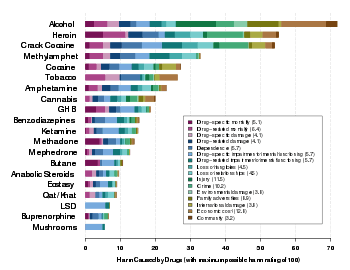Hallucinogen persisting perception disorder
Hallucinogen persisting perception disorder (HPPD) is a chronic (and sometimes permanent) disorder in which a person has flashbacks of visual hallucinations or distortions experienced during a previous hallucinogenic drug experience, usually lacking the same feelings of mental intoxication experienced before. Hallucinations are usually not intense or impairing and consist of visual snow, trails and after images (palinopsia), light fractals on flat surfaces, intensified colors or other psychedelic visuals. To be diagnosed, the disorder must cause distress or impairment in work or everyday life.[1] The flashbacks may be continuous or just occasional.[1] Symptoms often get worse when focused on.
| Hallucinogen persisting perception disorder | |
|---|---|
 | |
| HPPD noise simulation, often referred to as visual snow | |
| Specialty | Psychiatry |
HPPD subtypes
According to a 2016 review, there are two theorized subtypes of the condition:[2]
Type 1 HPPD
This is where people experience HPPD in the form of random, brief flashbacks.
Type 2 HPPD
People with this kind of HPPD experience ongoing changes to their vision, which may vary in intensity.
Cause
The only certain cause for HPPD is prior use of hallucinogens. Some evidence points to phenethylamines carrying a slightly greater risk than lysergamides or tryptamines. There are no known risk factors, and what might trigger any specific disturbing hallucination is not known.[1] Some sort of disinhibition of visual processing may be involved.[3] It has been suggested MDMA (ecstasy) use with other drugs is linked to the development of HPPD.[4]
Diagnosis
HPPD is a DSM-5 diagnosis with diagnostic code 292.89 (F16.983).[1] For the diagnosis to be made, other psychological, psychiatric, or neurological conditions must be ruled out and it must cause distress in everyday life.[1]
Treatment
As of 2020 there is still no good evidence of any specific medicinal treatment as being commonly effective for HPPD. Some reports point to sedatives being helpful but stimulants and cannabis worsening symptoms.
Avoiding any additional use of psychoactive drugs (including cannabis and alcohol) from an early stage of the disorder seems to be the most effective way in which most sufferers achieve recovery, as these substances apparently worsen the condition over time.
Some prescription drugs (Lamictal, clonazepam and keppra) have been known to relieve symptoms for some, but worsen symptoms or create dependencies for others.
Antipsychotic drugs and SSRIs have also been reported to help some people but worsen symptoms for others.
Some sufferers have reported benefits from prolonged water fasting, medications like NAC and Lithium, and from supplements like L-Tyrosine, Ashwagandha and lion's mane, although some users report lion's mane and Ashwagandha as having potentially negative effects or creating dependencies.
Sunglasses and talk therapy might also help those who are dealing HPPD, but in general it seems that maintaining sobriety from all psychoactive substances is still the best solution available for this condition, as it's been proven to naturally relieve the disorder over time in most sufferers. Doing this as early as possible could be the most important known factor in recovery from HPPD.
Prevalence
The prevalence of HPPD was unknown as of 2018. Estimates in the 1960s and 1970s were around 1 in 20 for intermittent HPPD among regular users of hallucinogens. It is not clear how common chronic HPPD may be, but one estimate in the 1990s was that 1 in 50,000 regular users might have chronic hallucinations.[1]
In popular culture
In the second episode of the first season of the 2014 series True Detective (Seeing Things), primary character Rustin Cohle (Matthew McConaughey) is depicted as having HPPD symptoms such as light tracers as a result of "neurological damage" from substance use.[5]
References
- Halpern, JH; Lerner, AG; Passie, T (2018). "A Review of Hallucinogen Persisting Perception Disorder (HPPD) and an Exploratory Study of Subjects Claiming Symptoms of HPPD". Current Topics in Behavioral Neurosciences. 36: 333–360. doi:10.1007/7854_2016_457. ISBN 978-3-662-55878-2. PMID 27822679.
- Halpern, John H.; Lerner, Arturo G.; Passie, Torsten (2016). "A Review of Hallucinogen Persisting Perception Disorder (HPPD) and an Exploratory Study of Subjects Claiming Symptoms of HPPD". Behavioral Neurobiology of Psychedelic Drugs. Current Topics in Behavioral Neurosciences. 36. pp. 333–360. doi:10.1007/7854_2016_457. ISBN 978-3-662-55878-2. PMID 27822679.
- G Lerner, A; Rudinski, D; Bor, O; Goodman, C (2014). "Flashbacks and HPPD: A Clinical-oriented Concise Review". The Israel Journal of Psychiatry and Related Sciences. 51 (4): 296–301. PMID 25841228.

- Litjens, Ruud P. W.; Brunt, Tibor M.; Alderliefste, Gerard-Jan; Westerink, Remco H. S. (August 2014). "Hallucinogen persisting perception disorder and the serotonergic system: a comprehensive review including new MDMA-related clinical cases". European Neuropsychopharmacology: The Journal of the European College of Neuropsychopharmacology. 24 (8): 1309–1323. doi:10.1016/j.euroneuro.2014.05.008. ISSN 1873-7862. PMID 24933532.
- Fukunaga, Cary Joji, 1977- Cuddy, Carol. Pizzolatto, Nic, 1975- McConaughey, Matthew, 1969- Harrelson, Woody. Monaghan, Michelle. Potts, Michael (Performer) Arkapaw, Adam. Hall, Alex (Film editor) Burnett, T-Bone., True detective., OCLC 964500128CS1 maint: multiple names: authors list (link)
External links
| Classification | |
|---|---|
| External resources |
